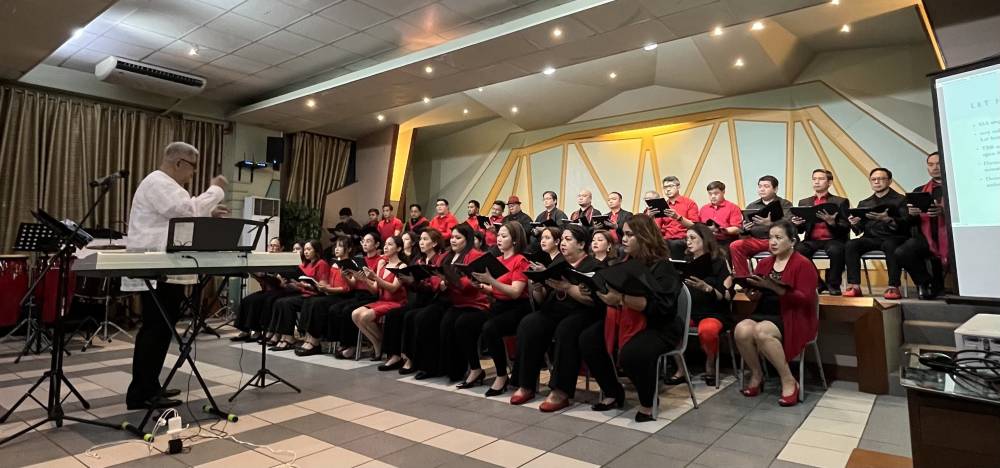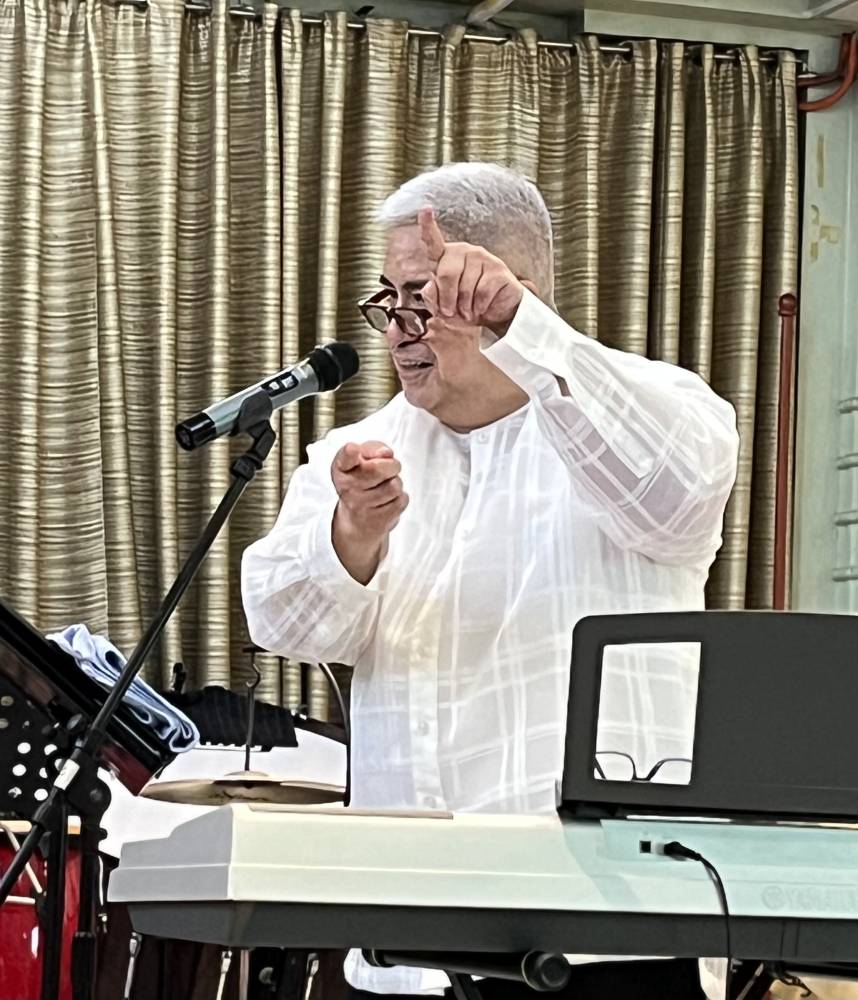Jonathan Velasco leads Ateneo Chamber Singers in rousing lecture recital

Conductor Jonathan M. Velasco, conducting the Ateneo Chamber Singers (ACS), treated Manila’s choral enthusiasts to a delectable choral concert held recently at the Founders Hall of the St. Paul University-Manila, College of Music and Performing Arts. The occasion was his second lecture recital, a requirement for the degree of Doctor in Musical Arts, major in choral conducting, which he is pursuing at the said university.
The recital, titled “Of Life and Love,” featured the ACS, which he has been conducting for the last two decades.
Under his conductorship, the ACS has grown into one of the country’s major choral groups that has earned accolades for its singing of sacred choral works. It has garnered several top prizes in choral competitions in Europe, and is the recipient of the National Commission for Culture and the Arts (NCCA’s) National Sudi Award in 2021. Velasco is a much sought-after choral conductor, clinician, and adjudicator, both national and international, and since November of last year, has sat as a member of the Board of Trustees of the Cultural Center of the Philippines (CCP).
The audience, mostly choristers, choral conductors, students and faculty members, and culturati, came in droves, led by Dr. Jaime C. Laya, chair of the CCP’s Board of Trustees; Irene Marcos-Araneta, herself a musician and a staunch supporter of the musical arts; Dr. Raul Sunico, dean of the university’s College of Music and Performing Arts; Sr. Ma. Theresa Asencio, SPC, associate dean of the said College of Music; and Dr. Joel P. Navarro, the recitalist’s mentor.

Premiere performance
After brief welcome remarks and an introduction by Dr. Navarro, Velasco gave his lecture through a PowerPoint presentation. He introduced the pieces composed by the Polish composer Sven-David Sandstrom (1942-2019), “Four Songs of Love”; British composer Paul Mealor (b.1975), “Now Sleeps the Crimson Petal”; and American composer Daniel Elder (b. 1986), “Three Themes of Life and Love.”
Giving assistance were percussionists Kevin Castelo and Christian Daniel Borres.
The recital marked the premiere performance of the works in Manila.
His lecture touched on the structure, compositional and rhythmic language and dynamics of the featured works. In the process, he excerpted highlights of the pieces which were sang by the choir at his back. His lecture prepared the audience for an evening of full, absorbing and literate listening. At the close of his lecture, he told the audience unabashedly that it took the choir a year to learn Sandstrom, and half a year for both Mealor and Elder!
A short break followed after the lecture before the performance resumed. The choir, which Velasco has led for about two decades now, showed a mature, resplendent sound. The singers capably executed the dynamics that ranged from extremely soft to rousing, loud passages. In addition, the high notes of the soprano and tenor sections were secure and shimmered with brilliance. The altos and the basses, on the other hand, showed ease in projecting rounded and earthy sounds in both the high and low registers. This was convincingly demonstrated in the opening number that featured Sandstrom’s “Four Songs of Love,” a set of four poems taken from “Song of Songs,” whose central theme celebrates love between two lovers. Here, the choir showcased a radiant, full-bodied sound. Arresting were the female voices as they divided into three voices and intoned the first few bars of the opening song, “Let Him Kiss Me,” with the male voices also dividing into three voices as they intoned their parts. An enthralling repartee ensued until all voices intoned very soft passages toward the end, still enough to be joyously heard.
Choral cycle
The next number, “Now Sleeps the Crimson Petal,” is a choral cycle of four madrigal texts that are “linked together,” as the composer explained in an email to Velasco that was printed in the program, with the texts “referring to roses either directly or as a metaphor for love.”
A highlight of this work is the last, “A Spotless Rose,” that seemed to recall the elements used in the previous three songs before it ended on a definite major tonality. The German text had been previously translated as “Lo How a Rose E’er Blooming,” a direct biblical quote heard during the Yuletide season. The translation used by Mealor was that of Catherine Winkworth from 1919. As the last note faded out of this moving, prayerful piece, one was tempted to say softly to himself, “Merry Christmas!”
The final work by Daniel Elder provided a stark contrast to the previous two works. The piece is written for choir and percussion, and the playing of the percussions, drums, bells, glockenspiel, etc. highlighted the piece to make it somewhat festive. The ACS easily and eloquently met the wide range of dynamics the piece called for, as the audience listened in awe.
Velasco conducted with ease. He moved his bare hands with supreme authority. He gave precise cues and beats that led the choir into magnificent singing. Needless to say, thunderous applause greeted the choir as the last note faded out.
Such a glorious performance moved Irene Marcos-Araneta to say, “Such lovely music was made today!”
Indeed, the concert was a feast of new choral sounds, affording the audience a different soundscape for sacred and romantic love. —ANTONIO C. HILA

















